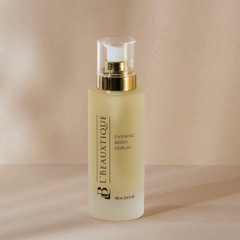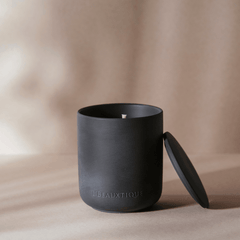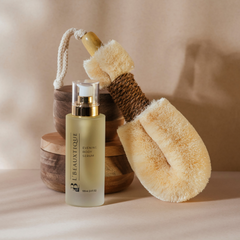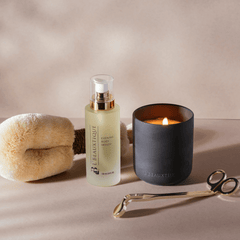Essential oils are a potent gift from nature that promote your skin's healthy glow and vitality
Stress, lack of sleep, or sun exposure can damage your skin. Luckily, essential oils have natural healing properties that can work wonders to rejuvenate your natural radiance, brighten your complexion, and boost your confidence.
Here are our favorite essential oils for skin glow and tips on incorporating them into your skincare routine.

What essential oils are best for glowing skin?
Lavender (Lavendula angustifolia) - Soothing and Rejuvenating
Lavender essential oil is a skin-loving essential oil that addresses various skin concerns. With its skin-regenerating properties, Lavender essential oil helps to promote cellular repair and combat environmental damage. It also possesses calming properties, which can reduce stress, help you wind down before bed, and get the TLC you need to maintain a healthy glow from the inside out.
To use Lavender for a relaxing, skin-nourishing ritual, never apply directly onto your skin, dilute a few drops in Jojoba or Argan oil and massage it into your face before bedtime.
Carrot seed (Daucus carota) - Anti-inflammatory and Restorative
Carrot seed essential oil is prized for its anti-inflammatory properties that help alleviate skin redness and irritation. It also offers antioxidant benefits, making it a popular choice for skin care. Its anti-aging properties help combat free radicals, reducing wrinkles and other signs of aging, while its capacity for skin cell regeneration can improve skin texture and healing.
Ylang ylang (Cananga odorata) - Balance and Calm
Known for its exotic floral scent, Ylang ylang essential oil brings a delightful aroma and a multitude of skin benefits. Its sebum-balancing properties make it suitable for all skin types, helping to regulate oil production and reduce acne breakouts. Create a spa-like experience by adding a few drops of Ylang ylang essential oil to a warm bath (add to a dispersant, like honey, first. You can also combine it with a carrier oil for a relaxing massage.
Which essential oils are best for your face?
We never recommend applying essential oils directly on your skin. Since they're highly concentrated plant extracts, essential oils can irritate your skin or cause allergic reactions if not properly diluted.
That said, some essential oils are considered gentler and may be suitable for facial use when properly diluted. These include:
Lavender (Lavandula angustifolia)
Lavender essential oil is known for its calming, soothing properties and may be beneficial for some skin types.
Tea tree (Melaleuca alternifolia)
Tea tree essential oil is often used for its antimicrobial properties and might be helpful for individuals with acne-prone skin.
Rosehip (Rosa canina)
While technically not an essential oil, Rosehip is a carrier oil rich in vitamins and antioxidants, making it potentially beneficial for skin health.
Chamomile (Anthemis nobilis)
Chamomile essential oil's anti-inflammatory properties may be suitable for sensitive or irritated skin.
Remember, everyone's skin is different. What works for you may not work for someone else. Always do a patch test and listen to your skin's response before incorporating essential oils into your facial routine or look for professional essential oil products.

What are the best essential oil blends for the skin?
When you want to truly treat yourself, here are three essential oil blends we recommend adding to your skincare.
Calm and soothe
This blend is ideal for sensitive or irritated skin. Lavender and Chamomile essential oils have calming properties that can help reduce redness and inflammation, while Frankincense (Boswellia carterii) essential oil may promote skin regeneration and overall skin health.
- 2 drops Lavender (Lavandula angustifolia)
- 2 drops Chamomile (Anthemis nobilis)
- 2 drops Frankincense (Boswellia carterii)
-
Carrier oil (like Jojoba oil)
Clear skin blend
With Tea Tree oil's antimicrobial properties, Lavender oil's soothing abilities, and Geranium oil's ability to balance oil production, this blend is excellent for acne-prone or blemished skin.
- 2 drops Tea Tree (Melaleuca alternifolia)
- 2 drops Lavender (Lavandula angustifolia)
- 2 drops Geranium (Pelargonium graveolens)
-
Carrier oil (such as Grapeseed or Rosehip oil)
Relaxing floral blend
This blend creates a soothing and uplifting aroma, combining the sweet, floral notes of Jasmine and Ylang ylang with Bergamot's bright and citrusy scent. Use it for relaxation, stress relief, and to promote a sense of well-being.
- 2 drops Jasmine Jasminum grandiflorum
- 3 drops Bergamot Citrus bergamia
- 2 drops Ylang ylang Cananga odorata
-
Carrier oil (such as sweet Almond oil)
While creating a new essential oil blend yourself is always fun, sometimes, you need something luxurious to add to your self care.
That's where we come in. Our Evening Body Serum seamlessly blends Jasmine, Bergamot, Ylang ylang and 5 other essential oils to support your nighttime skincare routine while simultaneously indulging your senses.

How often can you use essential oils for skin health?
Here are some general guidelines:
Dilution
Always dilute essential oils before putting them on your skin. For adults, the recommended dilution ratio is typically 1% for facial applications or 2-2.5% for full body products. That means adding 6-9 drops per ounce for a 1% dilution and 15-23 drops for a 2.5% dilution to a carrier oil like jojoba, coconut, or almond oil.
Patch test
Do a patch test before using a new essential oil on a large skin area. Apply a small diluted amount of the essential oil on a skin patch and check for redness, itching, or irritation.
Check your sensitivity
Pay attention to how your skin responds to the patch test. If you experience any adverse reactions, reduce the frequency of use or discontinue use altogether. Always listen to your body and adjust accordingly.
Making essential oils part of your skincare routine can be a transformative remedy for stress
Essential oils have the tremendous power to transform your skin. By making aromatherapy an integral part of your self care routine, you can protect your complexion and unlock the secret to glowing, youthful skin.
For more holistic living advice along your journey, subscribe to our newsletter.










Leave a comment